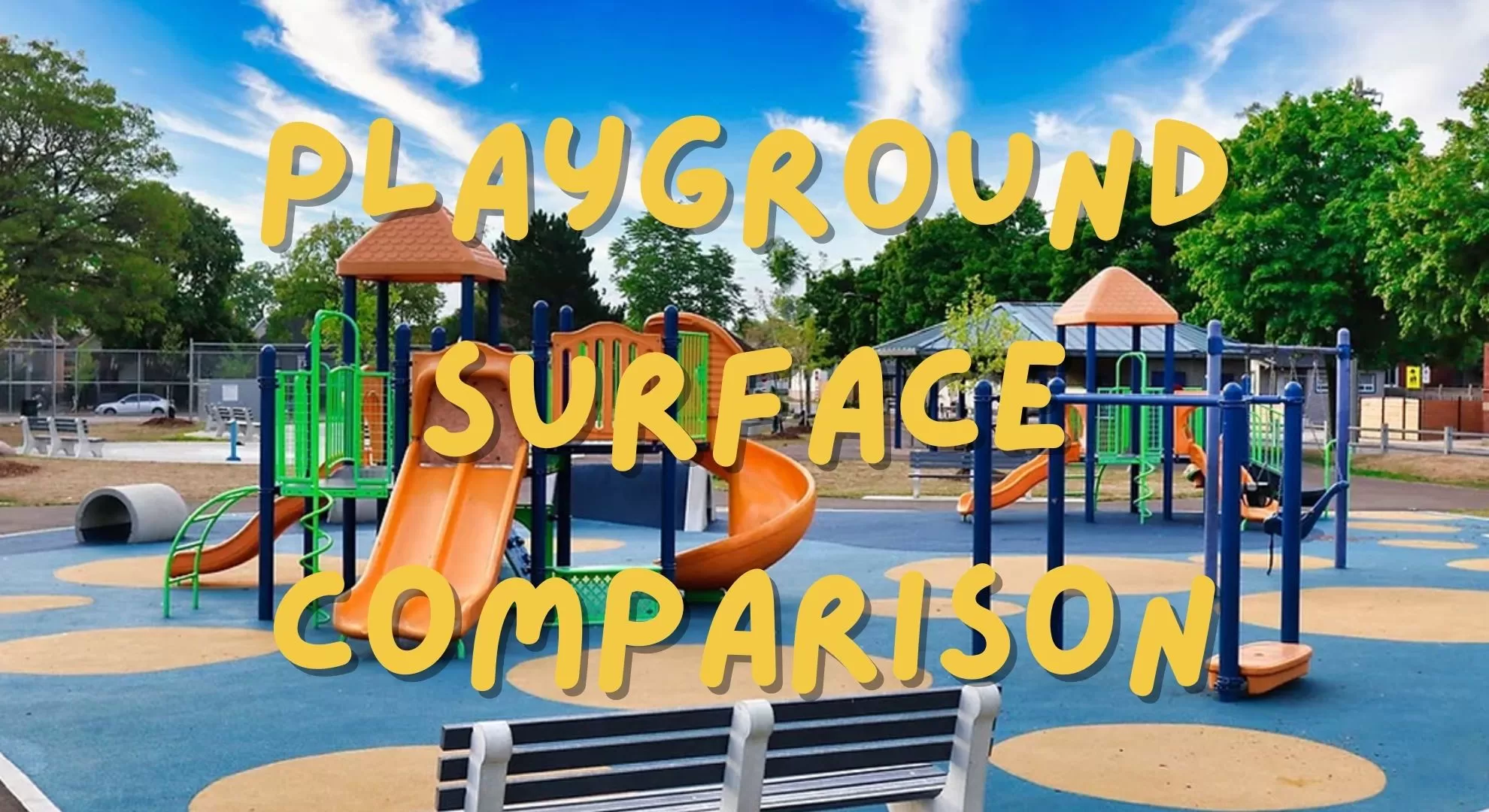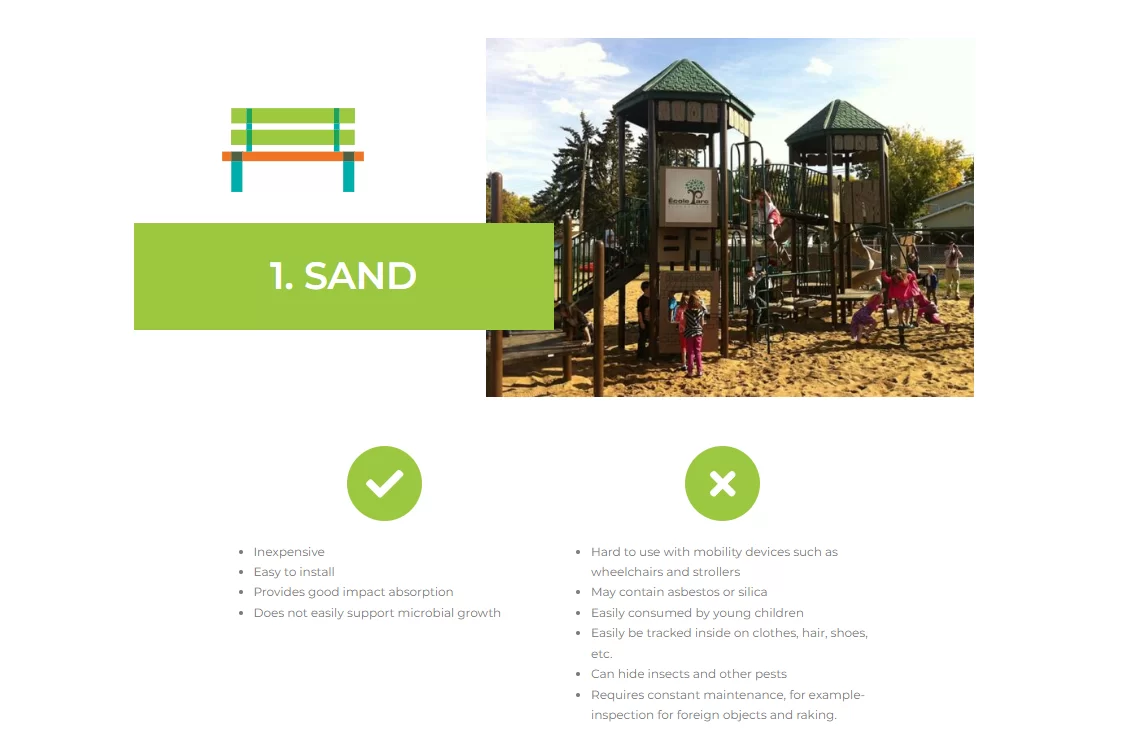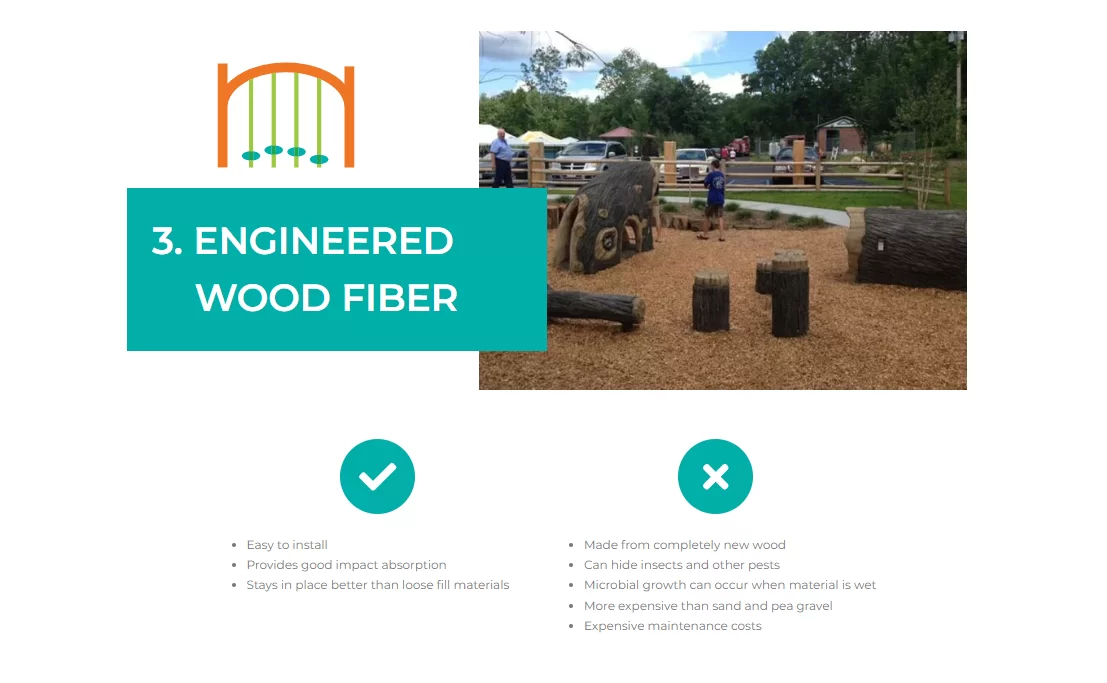Every playground’s success starts from the ground up – literally. Choosing the right surface material isn’t just about aesthetics; it’s about safety, accessibility, and long-term value. As a leading playground equipment manufacturer, NanPlay understands how critical this decision is for schools, parks, and community centers. Whether you’re designing a toddler-friendly play zone or a high-traffic public park, the surface underfoot can make or break your project. Let’s dive into the pros, cons, and hidden costs of popular playground surfaces – and uncover which options align with your goals.


Sand is affordable and provides natural drainage, but it’s unsuitable for toddlers (choking hazard) and often migrates outside play areas. Though popular in beach-themed playgrounds, it requires daily raking and frequent replacement.
Made from recycled tires, rubber mulch offers excellent shock absorption (meeting ASTM F1292 standards) and requires minimal upkeep. However, it’s prone to displacement in high-traffic areas and may retain heat in sunny climates.

A budget-friendly choice, EWF provides natural aesthetics and decent impact attenuation. But it demands frequent raking and replenishing, making it less ideal for low-maintenance playgrounds.
Modern synthetic grass blends safety with aesthetics, offering consistent cushioning and drainage. However, it requires professional installation and periodic cleaning to prevent mold.
These tiles combine durability with DIY-friendly installation. They’re perfect for home playgrounds but may warp under extreme temperatures. For tips on installing them over concrete, check our guide to DIY Playground Surfaces.

This seamless, ADA-compliant surface is a favorite for disability-friendly playgrounds due to its smooth texture. While durable, installation costs are higher, and color fading can occur over time.
Safety First: Prioritize materials with certified impact absorption (ASTM/CSA standards).
Budget Realities: Factor in installation costs and lifespan. For example, PIP rubber lasts 10+ years but costs 2x more than wood chips.
Climate Compatibility: In coastal areas, salt-resistant materials like rubber tiles prevent corrosion. For snowy regions, avoid sand (freezes solid) and prioritize permeable surfaces like gravel.
Accessibility Needs: Ensure compliance with ADA guidelines for wheelchair access.
| Material | Safety Rating | Lifespan | Maintenance | Cost per Sq.Ft | Best For |
|---|---|---|---|---|---|
| Rubber Mulch | High | 5–7 yrs | Low | $3–6 | Budget-conscious projects |
| Engineered Wood Fiber | Moderate | 3–5 yrs | High | $1–3 | Natural-looking designs |
| Poured-in-Place Rubber | High | 10+ yrs | Medium | $8–12 | ADA-compliant playgrounds |
| Artificial Turf | Moderate-High | 8–10 yrs | Medium | $5–10 | All-weather durability |
| Sand | Low-Moderate | 1–2 yrs | High | $0.5–2 | Temporary play areas |
| Rubber Tiles | High | 7–10 yrs | Low | $4–8 | DIY backyard setups |
Data sources: CPSC Playground Safety Handbook, 2023 industry surveys
DIY-Friendly Options: Interlocking tiles or wood chips are ideal for small projects. For larger installations, hire certified contractors.
Drainage Solutions: Pair surfaces with a 6-inch gravel base to prevent water pooling (CPSRG guidelines).
Longevity Hacks: Pressure-wash artificial turf annually and inspect rubber surfaces for cracks. In snowy climates, use permeable surfaces to avoid ice buildup.
Q: What’s the safest surface for toddlers?
A: Poured-in-place rubber or rubber tiles provide the best fall protection.
Q: Can I install playground grass over concrete?
A: No, always use a shock-absorbing base layer.
Q: How often should I replace wood chips?
A: Top up annually and replace entirely every 3-4 years.
Q: Are rubber tiles safe for toddlers?
A: Yes, ensure they meet ASTM F1292 standards (min 6” thickness for falls over 6 feet).
Q: How to keep sand clean in playgrounds?
A: Rake daily, use a UV-resistant cover, and replace entirely every 6 months.
12 Types of Playground Surfacing Materials
How to Design an Inclusive Playground
DIY Playground Surfaces: A Step-by-Step Guide
Thank you very much for your inquiry! Your trust is our greatest motivation. We are committed to offering playgrounds that combine high quality with affordable pricing. Let us bring vitality to your venue!